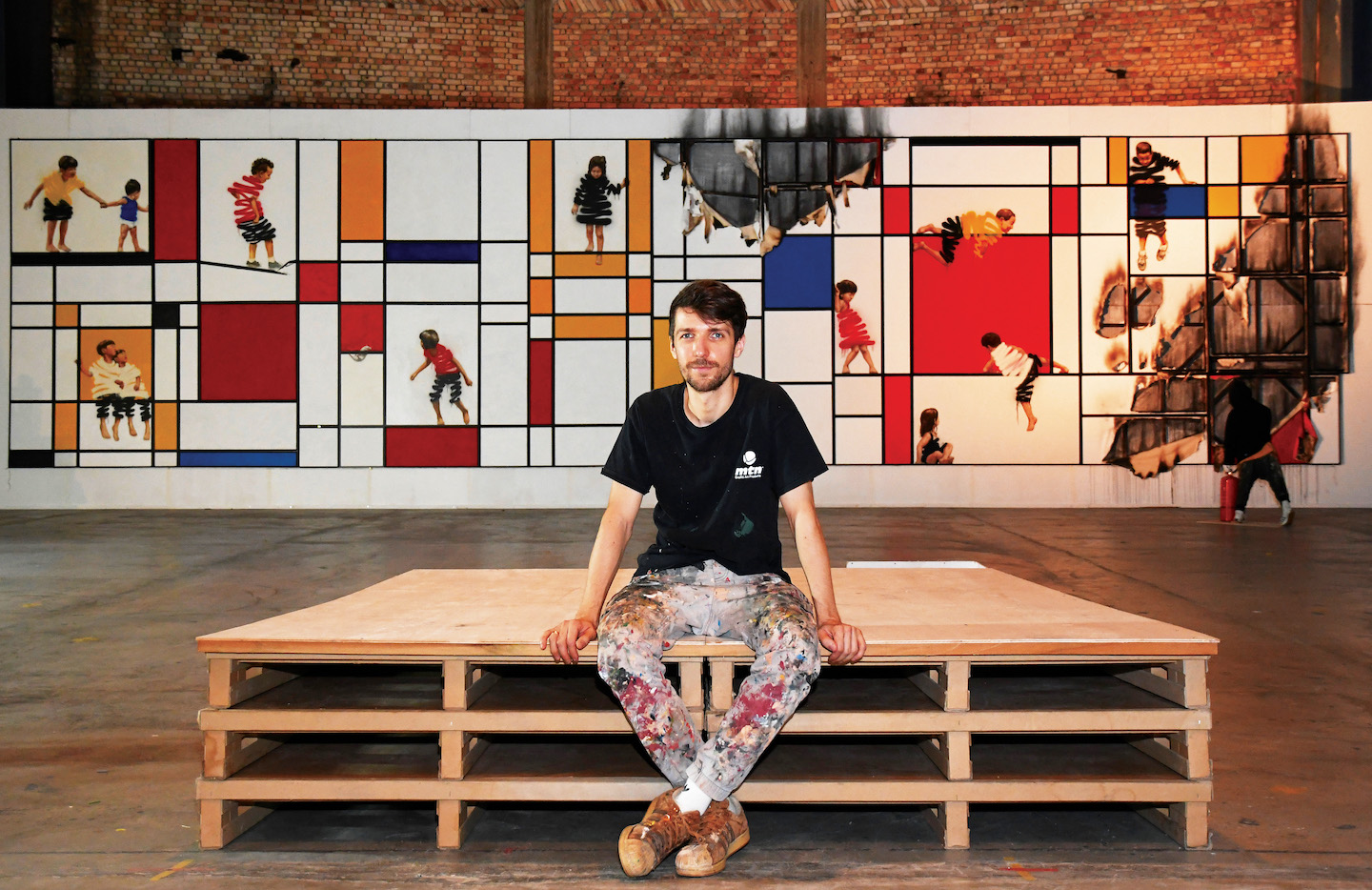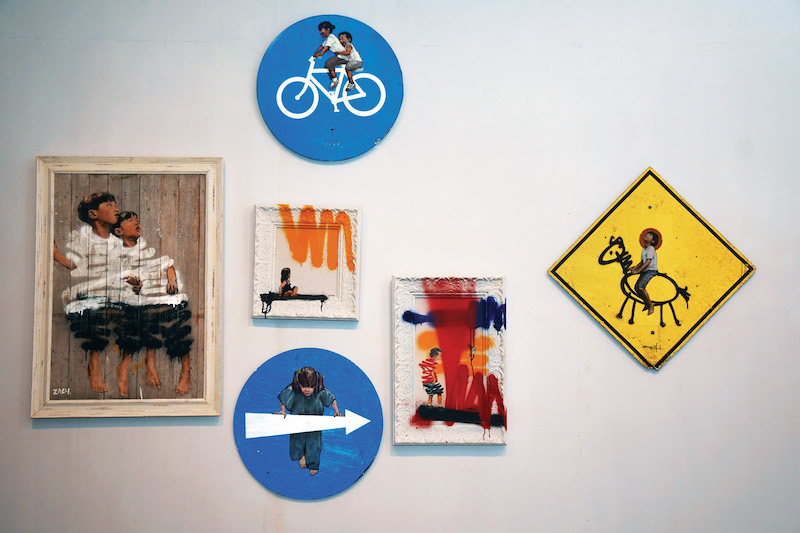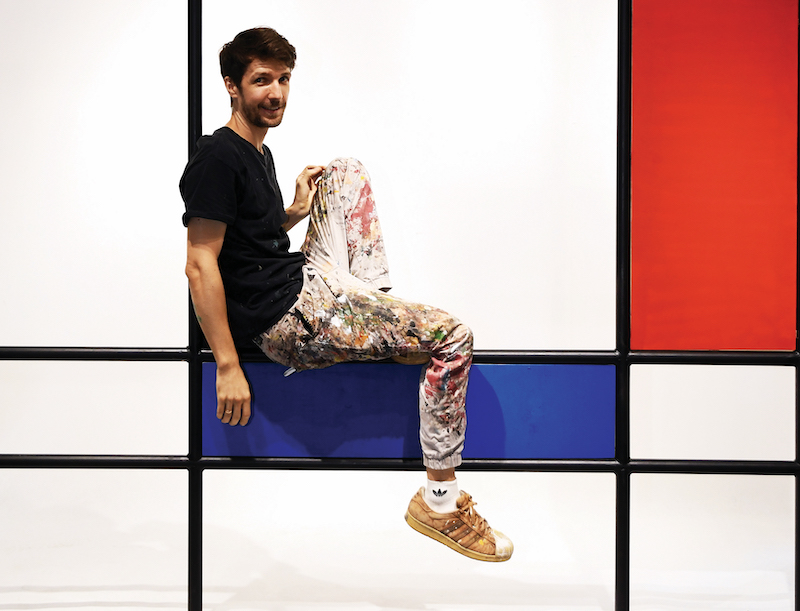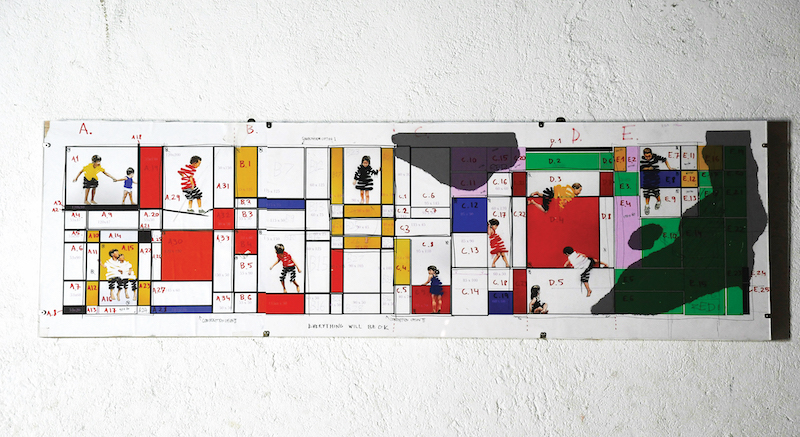
The multidisciplinary artist known for his street murals felt free to create art for art’s sake (All photos: Ernest Zacharevic)
The lockdowns that weighed heavily on many during the pandemic gave Ernest Zacharevic the luxury of time and unfettered creativity. Confined to his studio-cum-home in Penang, the multidisciplinary artist known for his street murals felt free to create art for art’s sake.
The result is Everything Will Be OK — a huge work featuring compositions of children in primary colours on assembled canvases — that is specific and personal to him in different ways.
“What makes it personal is the fact that I didn’t do it for anyone or anything else,” says Zacharevic, looking back on the last two years. “I wasn’t looking to satisfy a client or fit a theme or to commercially monetise it. I really did not stop myself from building this piece. Sometimes, when painting, you think a work is a little too big or maybe you don’t have time for it. This one had no limits. I really enjoyed the process.”
The work captures children at play against white backgrounds and within grids of black lines, separated by blocks of red, blue and yellow — a reference to Dutch artist Piet Mondrian, who used colours, shapes and textures to achieve their effect. There are patches of burnt canvas and a sculpture of a figure with a fire extinguisher, added recently, standing before the whole work.
The young figures on the canvas are based mostly on family members and the children of friends, young ’uns whom Zacharevic has used in different projects and watched grow over the years.
ernest_zacharevic_other_works_at_everything_is_ok.jpg

“It’s a sweet-and-sour piece, very positive and colourful as well as very uncertain, with dark moments. It’s sort of what I want to convey: being positive in dark times.”
The title of the 16m by 4m creation came to Lithuanian-born Zacharevic as the coronavirus brought problems and unanswered questions. Lately, Russia’s invasion of Ukraine has been heavy on his mind. He says: “There is a sense of fear and anxiety in my country and the worst-case scenario seems to be very bad. It’s hard talking to my friends and family [whom he has not seen for almost three years].
“Nothing about our situation now says it is okay. But we all have moments of brightness — our Zoom call with family, our pet time with the cat in the morning. Little things can give you the feeling that everything is okay for that moment.
“I am still an optimist and I do believe a brighter day will come. Emotionally and in my head space, I feel content not trying to change what I can’t change and just focusing on the things that are in my hands.”
Work has kept him sane and what he enjoyed most during isolation was being able to do what he likes, “just coming up with artwork and making it happen without any reason, without the clamour of exhibitions, without clients sitting behind my back and judging every stroke. It’s been emotionally and artistically very refreshing for me to spend these two years just focused on my work. That kept my sanity in place.”
The single focus led to a creative outflow that he is now ready to share, including the pieces that make up Everything Will Be OK, a project that took its first step in 2015, when he painted a mural in the US on the same theme. “I thought it would transfer very nicely to a canvas work,” says Zacharevic.
ernest_zacharevic_solo_shot_3.jpg

It obviously does. A canvas display he subsequently painted and showed at The Ritz Carlton, Millenia Singapore received a lot of enquiries. But it was too big to fit in anyone’s home and people kept asking him to sell half, a quarter or even parts of it.
“I liked the idea of the work being not sellable in terms of scale, so I started thinking about how it could be extended, maybe add elements as it grew.” He regrets selling a couple of sections in the beginning because “I made them as a whole and, when people take a [part], it disturbs the balance and process of the whole piece. At some point, I decided not to show the work to the public until it was ready”.
Every segment of Everything Will Be OK is a separate piece of canvas measured to fit into the whole frame. They were fashioned in different places over the years, then framed together following a working graph.
“I have changed my studios many times over the years. Whenever I was overseas, I would paint one section and roll it up and send it to Penang [home for him and his wife, model and embroidery artist Sheena Liam], and then paint another section in another place, mostly because I was travelling so much before the pandemic. I also had to fragment the piece into sections because I didn’t have the luxury of time to work on something of that scale all at once.”
There are white spaces within the frame where he can add figures and Zacharevic, who finds REXKL an ideal venue for the project and concept, thinks it might still happen. “The piece is ready to be viewed but I don’t think this is the end of it. I do see it evolving and changing in the future. I’m hoping to show it at new venues later, with things added, things changed.” Such as incorporating full projections of screens, video parts and elements.
He is preparing for an exhibition in Europe, initially set for May but now likely to be postponed. He is currently one of four artists involved in Going Places; Travels of the Mind, Spirit and Heart (Feb 24 to April 10) at Singapore’s Art Porters Gallery, curated to show what street artists have been up to since the coronavirus upended lives.
Besides painting, Zacharevic has also been busy with Cultprint Editions, a print studio he set up in 2020 when travel restrictions stopped him from having his work printed in the UK and France. Before Covid-19 enforced “a healthy break”, he did fundraisers for an orangutan conservation and relocation project in Indonesia, important work he hopes to carry on eventually.
Zacharevic prefers not to give answers through his art, leaving visitors to interpret what they see and what it means to them so they, too, can be a part of the work. In the decade since his first constructive public art project — wall murals of two siblings on a bicycle and another of a boy on an old motorcycle beside a backdoor, a collaboration with the George Town Festival 2012 — there have been mixed opinions on the installations that locals and foreign visitors flock to.
“When we started, it was an innocent project of passion. Now, it seems like it is affecting communities and their surroundings, some in positive ways, some not so. Some people enjoy that Penang is known for the murals; others are not so keen on the influx of tourists and the reliance on tourism in local businesses. So, I try to be very careful about where and when I put things up in the streets.”
ernest_zacharevic_sketch.jpg

One happy outcome of street paintings is that the spiral strokes that make up the attire on his figures and flecks of paint dripping from sleeves and hems are now signature touches in his art. Quick strokes mean speed, which is crucial as he takes about two hours to complete a painting outdoors.
“What started as a practicality has slowly become my style. When you do ‘unauthorised’ work on a wall, you have to be very, very fast. When you paint and people come and shout at you, you run.” Has he ever had to scoot with brushes and paint? “I don’t run. I talk my way out of it. Most people don’t mind because the ideas are quite positive.”
Having a studio at home enables Zacharevic to work indoors. Does having a wife who is also an artist mean more inspiration and impetus to create? “Absolutely! I call her my artistic director and the things I do, I check with her. Sheena is very talented and has a good eye, but we try not to interfere in each other’s careers. We ask for advice sometimes but I think we’re both too opinionated to blindly follow it.”
Everything Will Be OK sees Zacharevic launching his first non-fungible token (NFT). Smaller versions of the hand-finished prints will be released one by one so people will be able to collect his works. He sees NFTs as a natural evolution of art and the pandemic has forced technology to democratise it and make it more accessible to everyone. He is educating himself on the ethical, efficient and practical ways of doing it.
“I think NFTs have the ability to push art even further and make it independent of producers, labels and galleries to help artists, especially those working in the digital space. I call them artists, an entire generation of Instagrammers and influencers who do so much creative content that doesn’t fit in any frame of traditional art. They are dancers and performers and create visual and digital art, which should be recognised as art. NFTs are a way for them to secure a place in the art world.”
'Everything Will Be OK' runs until March 22 at REXKL, Jalan Sultan, Kuala Lumpur. Click here for more details.
This article first appeared on Mar 14, 2022 in The Edge Malaysia.


